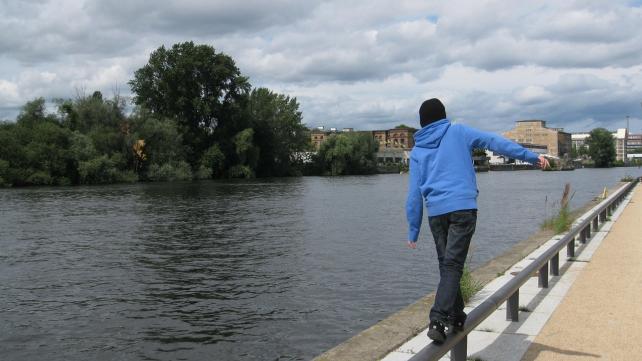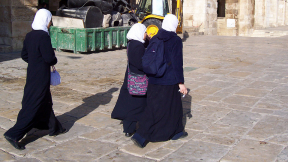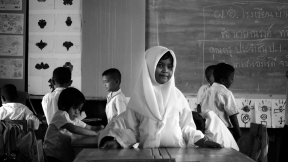
"Fatima" was a young, practicing Muslimah.
At 13, she was part of a family that tried to apply Islam in all aspects of life. They were role models for their local Muslim community. They were one of the very few Muslim families who did not even have a television set in their home.
Fatima talked about Islam enthusiastically, got good grades, respected her parents. While she did do some homeschooling, much of her time was spent in public school where she made sure to pray on time, wore her Hijab with pride and was active in encouraging others to do the same,
But then things changed.
She began smoking. Her Hijab came off. And on her 18th birthday, she ran away from home and eloped with a boyfriend she had been seeing for some time.
Fatima's story is not new. Nor is it uncommon.
What went wrong? How could someone from a family that had tried so hard to maintain an Islamic environment, struggled to raise kids who were practicing Muslims, take a turn on the wrong path?
No human being is an island. What happens to our neighbor, our children's classmates and our coworkers can very likely happen to us whether that's a soaring divorce rate, family miscommunication, domestic violence or the loss of religious values.
In other words, society's problems are not the problems of "those people out there". They are our problems, and if we ignore them they will come creeping up to us at one point.
The secret to keeping your kids practicing Muslims
Parents who practice Islam, an Islamic home environment, limited exposure to media with unIslamic messages: these are some of the ingredients Muslims often promote for ensuring their children are raised as good Muslims.
But these alone are not the solution. Such an approach works for a number of Muslim kids, but not for all. Fatima's example above should make that very clear.
It takes a bigger task than all of that: it takes making the society around you better.
Caring is the first step
Making the West, this powerful entity which has dominated Muslims' lives for over 300 years in the military, political and cultural spheres, obedient to God, is an awesome, and some would say virtually impossible task.
How can we make the West or America an Islamic place?
It's by caring about the future not just of our own kids, but by caring about the future of others.
From "these Kafirs" to "my people"
How many of us have caught ourselves saying it, whether to our kids or to our friends or under our breath: "these Kafirs" and their corruption; "these Kafirs (unbelievers)" and their mentality; "these Kaffir children" and their perverse, immoral ways?
If you have, you're not alone. This attitude though, was not the one adopted by Allah's Prophets.
In the Quran, the Prophets would say "Qawmi" (my people). They preached and persuaded and endured persecution to bring the guidance if God to their people. They did all of these things because they cared about their people.
They cared that these people, their people, were headed on the road to Hell and misery in this world and the next.
They did everything in their power to preach and persuade their people to accept the Truth so they would be saved. They were motivated by a mission, by a sense of responsibility, and a feeling of deep concern for those around them.
They refused to isolate themselves and their followers. They kept inviting and calling. Most importantly, they kept caring. They realized that this was a cause worth fighting for because they cared about humanity: men, women, poor, rich, believers, nonbelievers.
Lessons for us
Inviting others to the Creator is not a responsibility for just Prophets or those claiming to belong to groups that specialize in this task.
It is our responsibility.
We cannot present our message if we have contempt and disgust for those around us.
How can we expect our children to be saved from smoking if we don't care about our neighbor's child, whose parent is a chain smoker while she is getting sick because of it in front of our eyes?
How can we say we want our children to go to safe schools if we refuse to work with other parents, Muslim and non-Muslim, to ensure not just our kids, but all kids at the school are safe?
America: the good life, but with a price
Most Muslims who come to the West come to seek educational, employment and economic opportunities. They come seeking the good life they could not find back home.
But this good life comes at a cost: the struggle to maintain Islam in an environment in many ways diametrically opposed to Islamic values.
A very small number choose to go back. Some decide to fight it out by struggling to curb the negative influences, like Fatima's parents. But many simply give up and allow themselves to be washed away in the wave of assimilation.
Parents in the last two groups may look back and lament over how they lost their children. Some of them may think they did all they could: shelter their children, teach them right and wrong, provide a good home environment, etc.
But these parents forgot one thing. They forgot that in this land of opportunity in which they sought wealth and prosperity, there was opportunity for something else too: to invite others to the Truth of Islam.
To care about the things other parents cared about. To form a common agenda which could not only have saved their children and helped them to keep their Islam intact, but which would have also given back to the community they had chosen to make their home. To care as the Prophets cared about not just their own families, but the families and the children of all, not just the converted few.










Add new comment